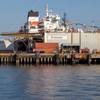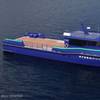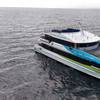A U.S. Navy destroyer detained and boarded a suspected pirate ship in the Indian Ocean last month, aiming to see that terrorists do not lash up with pirates in the Asia-Pacific region. The destroyer, the USS Winston S. Churchill, was ordered to intercept the suspected pirate ship on Jan. 21 after the U.S. Central Command, from its forward headquarters in Bahrain in the Persian Gulf, was contacted by the International Maritime Bureau, based in Malaysia. The maritime bureau monitors piracy all over the world, but especially in Asia. It took the U.S. warship several hours of maneuvering and firing warning shots to get the smaller vessel to surrender. A Navy boarding party then confiscated a cache of small arms to disarm the ship before sending it on its way. That effort, broadly defined, includes tracking thousands of ships, much as aircraft are monitored, knowing what cargoes the ships are carrying, driving off pirates when they attack a ship, or recovering the ship if it is seized. For several years, leaders of maritime nations from India and Sri Lanka in South Asia to Singapore and Australia and South Korea and Japan in Northeast Asia have worried that terrorists would seek alliances with pirates, particularly those operating in the South China Sea. Through that sea lane passes more international shipping each year than through the Suez and Panama canals combined. Terrorists who might seize, for instance, a large oil tanker and scuttle the vessel in the Straits of Malacca between Singapore and Indonesia would wreak economic, political, military and environmental havoc. Until now, the U.S. Navy has been reluctant to engage pirates because the service is stretched out with other duties. Asian coastal nations maintain that they do not want outside powers, notably the United States, operating in their sovereign waters, where many pirate assaults occur. Many Asian naval officers argue that combating piracy is the job of law enforcement, not navies. Many U.S. Navy officers agree but assert that some Asian nations lack the proper ships -- small, high speed and adequately armed -- to defeat or capture pirates. Moreover, coordination and intelligence sharing among the littoral nations has not been fully developed.
(Source: Washington Times)
Sponsored Content
Innovative Hull Maintenance: Profitable & Green

December 2024
 Read the Magazine
Read the Magazine

 Read the Magazine
Read the Magazine
This issue sponsored by:

Propulsion Choices begin with Fuel and End with Politics
Subscribe for
Maritime Reporter E-News
Maritime Reporter E-News is the maritime industry's largest circulation and most authoritative ENews Service, delivered to your Email five times per week










